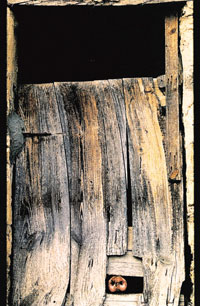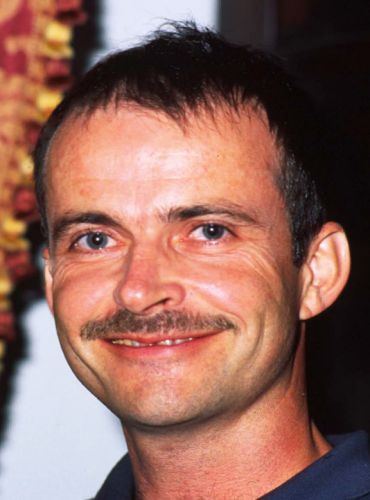"The mind is like a city," wrote Sigmund Freud, but to which metropolis would the good doctor have compared Harold Liebow, the latest recruit Ibiza History Culture? To the latter's native New York, that centre of excellence in so many areas of human endeavour? Or to ancient Athens, acme of pocket-sized capitals, where mind and body were so closely interwoven? Or maybe to an oriental city medieval Baghdad or Cairo in whose myriad alleyways the everyday goes hand in hand with the search for the divine? Or would Habsburg Vienna, cradle of western music, have been selected by the great psychoanalyst? Whatever his choice, Harold Liebow would undoubtedly have been completely at home in any one.
Our subject was first pointed out to me at a Christmas party as a formidable expert in hi-fi and broadcasting. Looking across the room, I saw a tall, distinguished-looking man with a fine head of grey hair whose features hinted (but only hinted) at sternness like a prophet tired of telling the Chosen People to get their act together. Languid Brooklynese drifted over, laced with an occasional piece of chutzpah. After that, I remember glimpsing him at SYP with his charming, frail-looking (but only looking) Finnish wife, Anja. The pair were putting a wayward and heavily-laden trolley through a complicated manoeuvre. Only after did I discover that Liebow dinner-parties were on no account to be missed. A year or so later I heard by chance that he was an accomplished artistic photographer (the book he co-wrote and illustrated about Ibiza is profiled in Weekly Edition 057 Saturday 30th March 2002), and thought I had him pigeonholed until a friend mentioned a musical evening devoted to Jewish music, during the course of which Harold's learned commentary dovetailed with a selection of examples spanning continents and centuries. It then transpired that he was an authority on tennis, as well as a former businessman, and ex-educationalist; and finally that he had worked at several stages as a journalist. I stopped being surprised whenever a new career or area of specialization popped into the conversation. Harold was well, Harold.
The story all began, appropriately enough in ‘Utopia', the summer camp for children set up by his parents in the Pocono Mountains of western New York State. Three thousand acres of virgin forest, rushing streams and wildlife, with a crystalline lake like a gleaming diamond at the very centre. Twenty odd bungalows housed the boys, all of them overlooking the lake and a similar number of girls, lived in a parallel set of chalets on the far side of the shimmering water. Utopia was more than just a recreational retreat: it was more of a Platonic republic with its own secretariats of health, security, commissary and culture. The four hundred youngsters spent two months learning about aspects of life which tended to get swept under the carpet in the Big Apple. There was fishing, canoeing, teamwork and semi-professional dramatics. The young Herbert Brodkin, first cousin to Harold and later a leading TV producer, directed the cream of the current Broadway crop. Hits like Waiting for Lefty and Bury the Dead! played to audiences of as many as a thousand, made up of the children, their visiting parents, staff and fascinated locals.
Amateur drama left Harold with two abiding loves. The first was the written word: he went on to read English Lit. at NYU (whose English faculty was one of the finest in the country) and might well have continued into the dense groves of academe had not other roads proved more beguiling. This profound identification with literature was to surface later though in contributions to prominent monthlies such as Off Duty (for ex-servicemen) Lookout and D'Oro (an article on Pablo Casals), as well as specialist journals like Hi-fi News and Record Review and Speakers. The second passion was music, initially roused from deep slumber by a Utopian staging of Odet's 1935 masterpiece, Awake and Sing! In this Harold played the part of a young man for whom a Mozart piano duet brings back powerful memories. A novice to the Viennese magic, Harold was so moved by the opening bars that he broke down on the stage and wept. The audience, unaware they were witnessing real life, went wild.
The summer camp to which minesweeping Lieutenant Liebow returned after the Pacific War were no longer the Ransomesque playgrounds of the thirties: teenage girls now spent entire days in dorms primping themselves for the night ahead while the boys no longer quite the same either. After two years of increasing disillusionment, Harold decided to sell out and enter the world of Manhattan business.
Fast forward to 1960: Harold's financial career takes a quantum leap when he starts a life insurance business with a nest-egg, and starts burning the midnight oil by the barrel. So successful is it that he works himself into a hospital ward and has a lawyer drawing up the final will and testament. Time to exit the rat race, fast. Bought out by his partner (it has since become the largest independent life insurance company in America) he decides to look around for a different way of earning a living.
Two years down the road, the self-taught photographer was beginning to sell pictures to mainstream journals when the really big break drifted along. He heard on the grapevine that educational giants McGraw Hill were looking for a writer/photographer team to do six photobooks about children across Europe. Harold and second wife Gina were born for it. The editorial board loved Harold's children's portfolio and they were engaged on the spot. (Readers can follow the story further in the 30th March issue as well as the Harold's piece in this one) After the Paris book Harold arrived in Ibiza in late December 1964. The Ibiza book was finished six months later. A final stint in Finland ended badly. The photography was completed, but Gina didn't write the book. Instead, she went back to the States for good and Harold returned to Ibiza, and has since remained. Both he and Anja, were in the final stages of divorce when they met.
There is much more to the Liebow story: the house he reformed on the outskirts of Ibiza town, the changes to the island which he has witnessed over the past four decades and the cavortings of colourful local characters for which he has enjoyed a front-row seat. For privileged Ibiza History Culture readers, the lights have dimmed and the curtain is about to rise.
Awake and sing, ye that dwell in dust: for thy dew is as the dew of herbs, and the earth shall cast out the dead.
Isaiah 26:19
Pictures Courtesy of Harold Liebow
These pictures are also published in an excellent anthology book,Eivissa-Ibiza: A Hundred Years of Light and Shade
Martin Davies
martindavies@ibizahistoryculture.com

